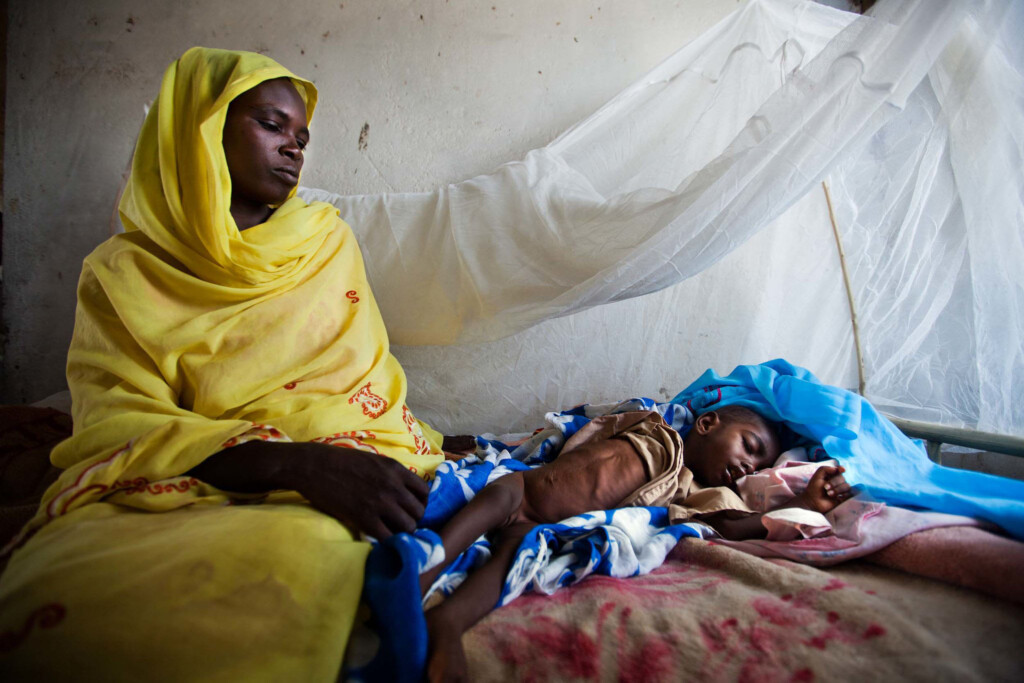Efforts continue to transport aid from Port Sudan to Darfur

A woman with her severely malnourished baby at a Darfur hospital (File photo: Albert González Farran / UNAMID)
The Sudanese High Committee for Humanitarian Aid Provision, chaired by Minni Minawi, governor of the Darfur region, is still working to realise secure and unhindered transport of aid and relief materials from the harbours of Port Sudan, capital of Red Sea state, to the west of the country – where many displaced are suffering from severe malnutrition.
South Darfur Governor Bashir Hasaballah told Radio Dabanga yesterday that efforts are being made to provide medicines and other humanitarian aid items to the affected states in Darfur.
He said that the High Committee for Humanitarian Aid Provision, consisting of Darfur state governors, commissioners of humanitarian aid, ministers, and advisors, and headed by Minawi, continues its efforts to coordinate the transport of aid.
Many people in Darfur, and in particular those living in camps for displaced people, are suffering from severe malnutrition. A group of UN experts reported on February 5 that “about 25 million people, including 14 million children, are in dire need of humanitarian assistance in Sudan”.
Médecins Sans Frontières (MSF) said that day that “all emergency thresholds for malnutrition have been reached” in Zamzam camp south of El Fasher, capital of North Darfur. The camp “requires an urgent humanitarian response as an estimated one child is dying every two hours.”
The General Administration of Camps for Displaced People in South Darfur said in a statement that “For the first time, we feel that all our people are in terrible danger and have been sentenced to death [by starvation].”
The community leaders urged the authorities “to save the remaining displaced people and refugees in South Darfur camps who are suffering from severe hunger, which kills dozens of them daily”.
Already in November, the UN Office for the Coordination of Humanitarian Affairs (OCHA) stated that “Sudan is experiencing a humanitarian crisis of epic proportions”. An estimated 20.3 million people – 42 per cent of the population – was facing acute food insecurity. More than 6 million people were “only one step away from famine”.
Obstacles
Efforts to provide essential aid to those in need are not only riddled with insecurity on the roads, but also with bureaucratic obstacles that remind many humanitarian agencies of the hurdles they were meeting during the regime of Omar al Bashir (1989-2019) – when Sudan’s then infamous Humanitarian Aid Commission (HAC) was mostly staffed by security officers who frequently denied access to INGOs and often treated foreign aid workers as western spies.
OCHA reported in end September that about 200 visa applications for international staff were ‘pending’ for two months, hampering the swift deployment of aid personnel.
In November, the Joint National Committee for Humanitarian Emergencies, set up by the de facto government in Port Sudan, held its first meeting, in which they spoke about the necessary measures to better facilitate the issuance of entry visas and procedures for those providing humanitarian aid, and the need to speed up clearance and distribution operations.
International aid organisations that month organised the Sudan Humanitarian Crisis Conference in Cairo, to tackle issues of social protection, food security, the impact of the conflict on the health system, gender-based violence, and issues of “coordination, localisation, and logistics of humanitarian work, including access and administrative difficulties”.
RSF Commander Mohamed ‘Hemedti’ Dagalo’s recent appeal to the international community to help save the people in Sudan has been met with cynicism in the country.
The Sudan Armed Forces (SAF) and the paramilitary Rapid Support Forces (RSF) reportedly agreed to meet in Switzerland to discuss humanitarian access in Sudan. UN Under-Secretary-General for Humanitarian Affairs and Emergency Relief Coordinator Martin Griffiths stated in a press conference in Geneva on Wednesday that he is “still waiting for the actual meeting to happen”.











 and then
and then